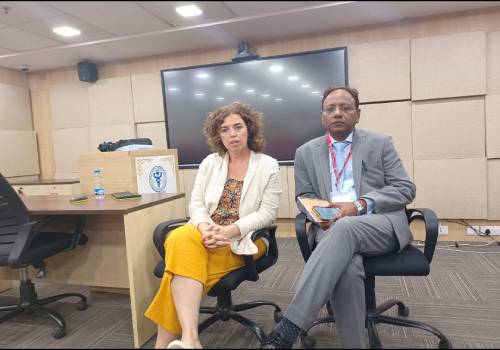
Spanish and US experts share expertise with AIIMS to boost organ donation
To increase the availability of organs in the country, a team of experts from Spain, Japan, Italy, and the United States shared their experiences, including the protocol and guidelines that are followed in those countries for organ donations, with doctors at the All India Institute of Medical Sciences in New Delhi.
The
Transplant and Procurement Program (TPM) course was part of a four-day
training workshop attended by doctors and other healthcare workers from
AIIMS and other parts of India.
It should be noted that cadaver donation in India is still insignificant in comparison to that in the Western world.
“We
want the TPM course to be implemented across India to increase organ
donation. We have learned that there are knowledge gaps among doctors
about organ donation. There is a lack of awareness among them on how to
certify a brain death,” Prof Deepak Gupta from the Department of
Neurosurgery at Delhi-AIIMS said.
“We
have tried to streamline the nitty-gritty of this issue at AIIMS. We
have taken a model from Spain, which has the best record of organ
donations in the world. Spain has the best organ donation rate per one
million population. So we thought, why not take their guidance to boost
organ donation in India,” Prof Gupta, who is also the in-charge of organ
procurement services at AIIMS, added.
He informed, “We organised a TPM workshop in which 50 doctors across India participated.”
Prof
Gupta said that doctors from multiple specialities, including
neurosurgeons, neuro-anaesthetics, paediatricians, and burn and plastic
surgeons, participated in the TPM.
He
added that the rationale behind inviting these 50 experts as they are
decision-makers and address the gaps and queries about organ donation.
Prof
Gupta further said that during the conference, the participants pointed
out the need to bring professionalism to the approach and inculcate
dedication to organ donation among the medical fraternity.
“There
is a dedicated team of doctors and transplant coordinators in West. We
need to form a similar group of doctors who will work on organ
donation.,” he added.
“We
are following it to a certain extent at AIIMS, and we have discussed
various issues with them and hope that in coming years you will see a
change (rise in organ donation),” he added.
Dr
Chloe Balleste, Director for international donation at Donation and
Transplantation Institute (DTI) Cooperation and Associate Professor at
the University of Barcelona, said, “The main secret of this Spanish
model is the professionalisation of the activities. In Spain, the
doctors from ICU take upon themselves the responsibility for organ
donation. It means that in every hospital in Spain, where there is an
ICU, somebody is responsible for organ donation.”
She
further said, “We are taking efforts to train the doctors and nurses in
the field of organ donation and we integrate these activities inside
organ donation.”
“The
hospital has the responsibility of organ donation. We have seen in
India many efforts have been taken, and at AIIMS, we are very happy to
be invited for this national course.”
“It
is the first time we have put together so many intensive care doctors
and surgeons who will be dealing with the process (of organ donation).
This should be done regularly because India is a continent by itself. We
need to adopt this model,” she stressed.
“We
are not talking about the model that has to be 100% replicated. It has
to become an Indian model, but for that first step is to have doctors
and nurses ready to do that, and for that, you need professionalisation
and training,” Dr Balleste added.
Explaining
the strategies the doctors in ICU adopt, Dr Balleste said that these
activities are based on science. They are based on skills and they are
based on professionalisation so that means if you are doing the job you
need to be rewarded.
“In
the hospital, there should be a budget to take care of the donation
cases. On the other hand, what I am saying is that this is a practice
that has to be sustained on the basis of scientific and professional
guidelines. That is why every hospital has to have a protocol, practical
guidelines and standard operating procedures,” Dr Balleste explained.